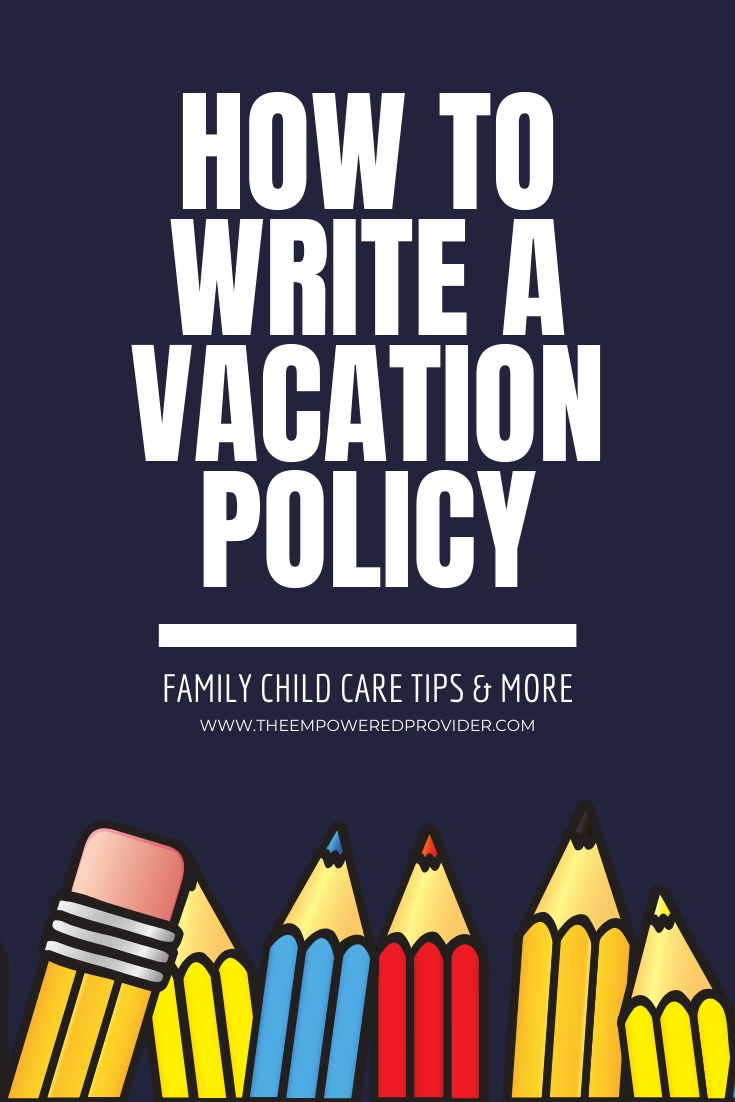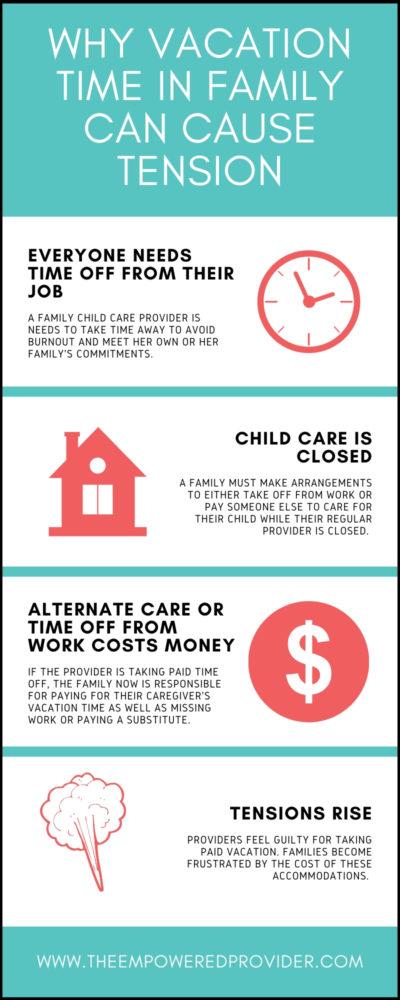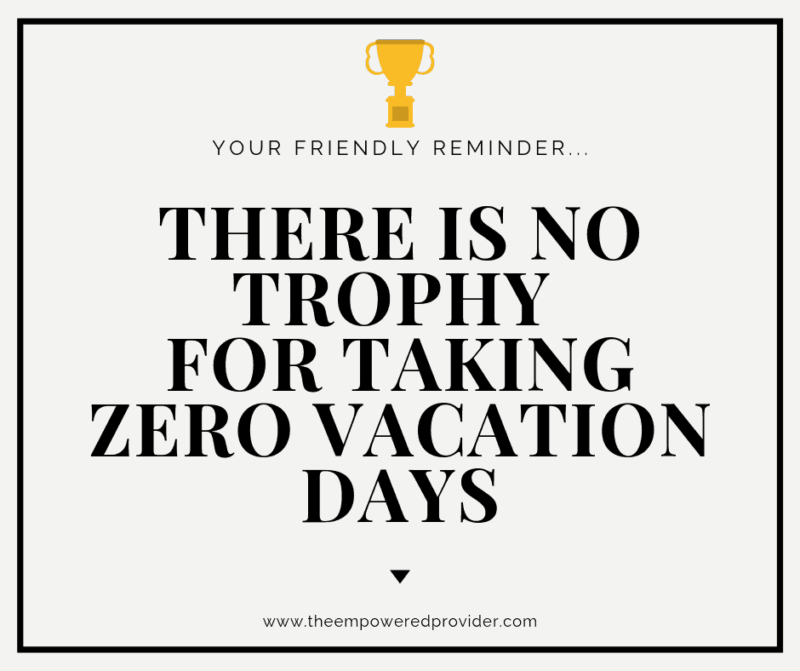A contract built between a child care provider and their client should include a section that addresses a home daycare vacation policy. I would argue that most family child care providers short-change themselves by not reserving enough days of the year for some good-old time away from their job.

This post is beneficial for both child care providers and their clients as I strive to enlighten both parties on the importance of a home daycare vacation policy.
HOME DAYCARE PAID VACATION: WHY IT’S IMPORTANT
A home daycare vacation policy varies from one program to the next. Some providers have a desire to be martyrs by priding themselves on taking a minimal amount of vacation days.

This isn’t the best approach. Caring for and educating other people’s children is physically and emotionally taxing. In order to do the job well, providers need to show up refreshed and ready to face the multiple challenges that come their way each day.
When you find yourself working day in and day out without taking time to recharge your mind, body and soul…burnout will start to set in.

HOME DAYCARE PROVIDER BURNOUT IS A REAL THING
Programs across the country are closing every week.
The International Child & Youth Care Network talks about providers growing weary from the stresses of their job. They have termed it “Burn Out Syndrome:
“The ‘burn-out syndrome’ is an extreme response to occupational pressure. It has been described as primarily an experience of exhaustion resulting from excessive demands on the worker’s energy and resources accompanied by a dehumanization of the caring process. The ‘burn-out syndrome’ appears to be widespread among human service workers whose work require intense interpersonal involvement.”
WHY THERE IS A NEED FOR PAID VACATION FOR DAYCARE PROVIDERS
Paid vacation days grant a hard-working provider to take time off without taking an income hit when they are closed.

Let’s take a look at how many hours the average provider works each week:
- Most daycare providers spend 50+ hours per week working directly with the kids in their program.
- They spend approximately another 10-15+ hours per week on preparation: cleaning the child care space, planning activities, planning the menu, and shopping for food and materials.
- Weekends and evenings often include phone calls with clients, interviews with potential clients and book-keeping.
That’s a 60-75 hour work week.
(This does not include the planning time that goes on before falling asleep or taking a shower, just sayin’).
Average Time off For a Daycare Provider
There are no rules when it comes to how much time off a child care provider can take. Some providers feel uncomfortable for closing their door for even a day while others have worked in the field for 20+ years and may have accumulated up to 5 weeks of vacation time.
A daycare vacation policy is unique to each program because it is run by a self-employed individual.
On average, family child care providers will take anywhere from 1 week paid vacation to 5 week’s vacation. This usually includes a compilation of paid holidays such as Thanksgiving, Christmas, Independence Day, etc.
A common fear I hear from providers is they are afraid they will lose clients if they add too many paid vacation days to their contract.
Why a Vacation Policy Can Cause Tension

Vacation Policy Tensions in a Nutshell
When a self-employed family child care provider takes a day off, there is typically no one to take her place. Parents have to take a day off of work or find a back-up care. Back-up care may mean paying double for child care (paying your provider for her paid time off and paying an alternate caregiver for the day).
The reasons listed above can often create major frustration among clients. Paying for a child care provider’s time off can feel like a nuisance.
Reality: Tuition funds dedicated to paid time off should be perceived as simply a part of the rhythm of paying for child care.
HIRING A DAYCARE SUBSTITUTE
Some family child care providers manage their home daycare vacation policy by hiring a substitute teacher. While this option saves the program from having to close for the day it does present risks when putting another adult in charge of your business for the day.
Tom Copeland shares some great tips about hired help. Tom explains the difference between an ’employee’ and an ‘independent contract worker’. There are various tax implications for both titles and heavy penalties when not handled correctly.
SO HOW MUCH TIME OFF SHOULD BE IN A HOME DAYCARE VACATION POLICY?
The number of vacation days listed in a home daycare vacation policy will vary from program to program. Ultimately, the number of days you choose to take is a very a personal decision.
As a provider, doing some self-reflection is the best way to understand how much time off you need to function at your best. Keep in mind the impact it will have on your clients but never let it deter you from taking a vacation.

A child care provider who brags about how much time he/she does NOT take off isn’t doing anyone a favor. Especially not the children.
Providers should consider the following when deciding how many vacation days to include in your contract:
- Is there a time of year that feels busier?
- If you have children at home, when could they benefit from you having a day off?
- Will you be taking any trips/vacations this year?
- Is there a time of year that seems to drag on.
- As for your clients, is there a time of year in which kids are absent that could align with your time off?
It is so very critical to be mindful of the breaks you take in this field.
Kids deserve spending their days with someone who shows up feeling dedication and joy, not burnout and dread.
Parents: What to do if you have questions about your home daycare’s vacation policy
In any aspect of family child care, communication is key. Work to have an open conversation about the vacation policy. Seek to understand, rather than criticize.
As a provider, I preferred to keep my rates the same for my current clients. Each year, as a raise I would typically add a paid holiday or a paid personal holiday to my contract. Often times my clients were grateful that I didn’t raise my rates and would rather have to make accommodations for a day I was closed.
It’s a delicate balance. A good provider knows that time off is essential to be good at her job but also understand that each day she is closed causes an inconvenience for her clients.
Providers who offer low quality service and are closed frequently, will typically lose clients. It’s just not good business practice. Pretty understandable I would say.
Looking for more inspiration?
 Hey there! I hold the work of early childhood educators (my title for family child care providers) in the highest regard! If you are looking for ways to better your business or to find inspiration to bring joy and meaning to your classroom, then you've come to the right place! Click here to read more!
Hey there! I hold the work of early childhood educators (my title for family child care providers) in the highest regard! If you are looking for ways to better your business or to find inspiration to bring joy and meaning to your classroom, then you've come to the right place! Click here to read more!
So I have worked at a daycare center before and I try to be very understanding about time off and such but I am finding that I feel the in home daycare my son is attending the number of vacation days is excessive. There is a registration fee and a yearly supply fee which is totally understandable but in the end with combined vacation days I am paying for over 5 weeks of time where I have to find alternative care for my son. She is closed for Labor Day, Veterans day, 3 days at Thanksgiving, the 24th through the 31st for Christmas, and then continues the 1st through the 3rd for New Years, Martin Luther King Day, Presidents Day, Memorial Day, Independence Day, and then vacation August 17th to 31st. All still at full price. She doesn’t do preschool time, and has only sent home one art project in the 4 months my son has attended. I have been trying to be understanding, but I really feel like this is excessive. Am I being unreasonable?
Hello Katrina! First off, thank you so much for stopping by my site and second of all thank you for asking this question. I don’t think there is a right or wrong way to write a vacation policy as a family child care provider. The decision to take paid or unpaid time away from your job as a self employed individual is a personal one. When a provider has a large amount of vacation days and they are all paid days, I understand how taxing that must be on your schedule and your budget. You also hinted at perhaps you’re not satisfied with the quality of care your son is getting which doesn’t help the situation. If you felt confident that your son was in your ideal setting for his early childhood experience, investing in your provider’s 5 weeks of vacation might just be part of the unfortunate cost of child care. However, if you’re not thrilled with the services and this much paid time off is a true burden on your family, it may be time to explore other options. There are a couple of details I’m also wondering about. 1) Sometimes people who have been in the profession for 20+ years give themselves some type of raise each year and it may not be in the form of a tuition increase but rather adding another vacation day so they can keep their rates steady. 2) Child care providers are offering a unique service to families who are under pressure to report to their places of employment each day and parents must be able to rely on their services. Being closed 5 weeks of the year causes disruption in the parents’ work week. From this perspective providers must be sensitive to the amount of time they are taking off. 3) Most family child care providers do a disservice to kids by not taking enough time off. They never take any time to reset and relax which can lead to burnout and poor quality of care. I hope some of the thoughts and ideas I’ve shared with you was helpful. If you want to discuss this further (which I’d love to!), you can email me: [email protected]. Thanks Katrina!
Good read. How do you deal with parents that don’t understand the cost of running a daycare and don’t understand why they have to pay more for part-time?
Hi Carol! Great question. I ran into this quite a bit early on in my career…then I figured out how to identify who was a ‘nickel-and-dimer’. I only partnered with families who a) had similar child-rearing styles as mine and who b) understand the value of quality child care. If it’s a good client who just doesn’t seem to grasp the ins and outs of the business, perhaps sit down and explain to them licensing limitations, training & licensing costs, supplies, etc. Paying more for part time is the same as anywhere else. It costs more for me to buy a dozen eggs than does for me to by 5 dozen. The cost per day goes down the more services you consume. This type of pricing is very common in all industries. Good luck! Most of all, don’t be intimated by those questions or change your rates because of it (I used to do that). Educate respectfully and if there’s still push back, remind them there are lots of other programs to choose from. Hope that helps! Let me know if you have any other questions!!
Hi Carol! Just a follow-up. That reply was from me, Roz Addler the author of this site. Not from Kristie. (She helps me with the technical aspects of my site from time to time. Neither of us can figure out why the comment follow-up was listed as from her and not me. LOL Thanks so much!
Roz Addler